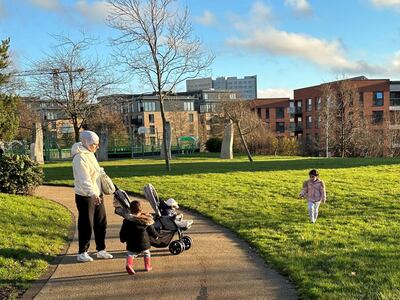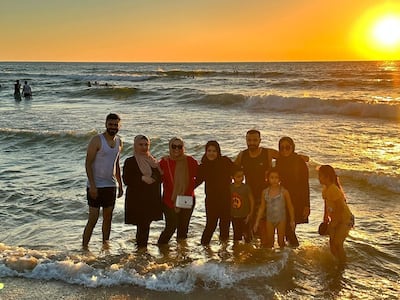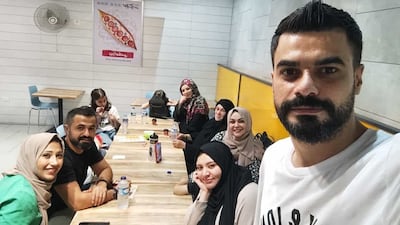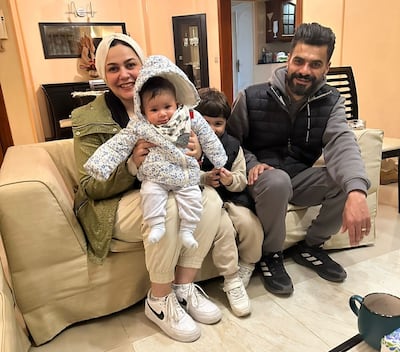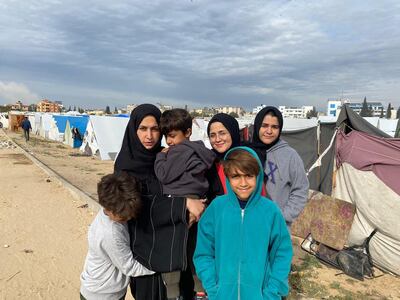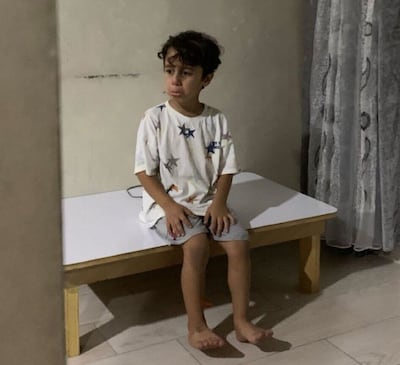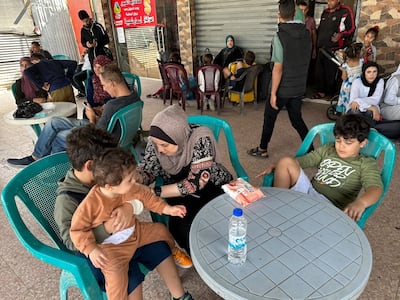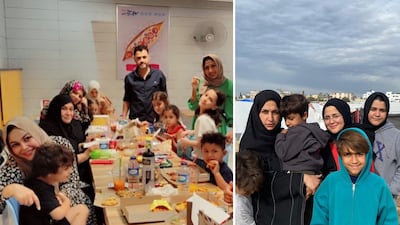Live updates: Follow the latest on Israel-Gaza:
When Mohammed Abou Foul’s four-year old daughter asks about the dolls she left behind in Gaza, he is reminded of the difficult decision he and his wife made to flee in November last year.
Mr Abou Foul, who is a British national and a lecturer in engineering, was evacuated along with 17 members of his family, including his parents, his siblings and children. Three weeks later, they landed in the UK.
Though he had lived and worked in the UK before, his family had not.
Now living in Birmingham, they are settling in to to their new lives. “My daughter wants to go play in the backyard of our home in Gaza. She still remembers the house and her dolls. This will not go away with time, she will always remember,” he said.
“My fear is how will I explain to my children that we took the decision to leave, to bring them here, to a place where they don’t have a connection to their roots,” he said.
He will return to Gaza one day, he says, but not to live there with his family. “It’s not a healthy place for my family in the foreseeable future,” he said.
“We lost everything, but we can’t look back. We have to stay focused on our new reality,” he said.
Since months into the war, the UK government is under increasing pressure to end its arms sales to Israel.
Three Supreme Court justices were among the 600 legal experts who signed an open letter to the Prime Minister on Thursday, calling for weapons sales to end. The letter said the UK risks breaking international law over a “plausible risk of genocide in Gaza.”
Hamas’s infiltration and attacks in Israel on October 7, in which 1,200 people were killed and more than 240 taken hostage, triggered the war in Gaza.
More than 33,000 Palestinians have been killed since, according to the Gaza Health Ministry, with tens of thousands more injured.
The vast majority of Gaza’s 2.2 million residents have been displaced, with most of them sheltering in the southern city of Rafah – which has now also come under siege.
The killing of seven aid workers from the World Central Kitchen by Israeli strikes on Monday has prompted two aid agencies, including WCK, to withdraw from Gaza for security reasons.
Humanitarian agencies have called for an immediate ceasefire to allow their staff to operate as famine looms and disease spreads.
Starting from scratch
Shortly after arriving in the UK, Mr Abou Foul found work as a university lecturer.
He and his wife spend much of their time filling out forms, so that they can register their children with a GP, find them a school, and move house. “We are starting from scratch. We came here with nothing, we left everything in Gaza,” he said.
His wife, a dentist, is not yet able to practice in the UK, because all of the official papers required to convert her qualifications are in Gaza. The university she graduated from, Al Azhar, was partially destroyed by Israeli strikes in November.
“She needs papers from Gaza but she can’t access them, or access references from the university or regulatory bodies. There is no one to contact, her old colleagues may be dead,” he said. “There is a lot of uncertainty in this process”.
His parents, who live nearby, have struggled to adapt to their new lives. “They stay all day in the house. It’s difficult for them to adapt to the new reality,” he said.
Back in Gaza, his parents had been doctors. His mother went to her gynaecology practice every morning and his father continued to see urology patients.
Mr Abou Foul was grateful to the British government who evacuated his family. “The Home Office and Foreign Office have been fantastic. We had the right support when we needed it,” he said.
More follow-up support was needed, he added, to help integrate families into the system. His siblings and brother-in-law were also looking for work, and some members of his family are applying for visas to extend their stays in the UK.
Evacuating loved ones to Egypt
With the Israeli military closing in on Rafah – the last place of refuge in Gaza – many British Palestinians are travelling to Egypt to help family members flee.
Narmin El Gabbour, a pharmacist based in the UK, recently returned from Egypt after spending weeks evacuating her brother, his wife and their newborn baby.
The baby, who was born a few weeks into the war, had become very ill and was showing signs of dehydration, prompting Ms El Gabbour to make the urgent trip to Cairo.
Evacuation for Palestinians is facilitated by an Egyptian travel agent, which charges from $5,000 per adult, and $2,500 per child.
Ms El Gabbour recalled scenes of chaos outside the travel agent’s offices, where she waited for days outside to be let in.
She was made to pay an additional sum just to enter the office so that she could register her brother Bahaa and his family’s name.
When Baha’ arrived in Cairo two weeks later, Ms El Gabbour found him changed.
“The first time I saw him, he was a completely different person. He looked older, he is 34 but looked like he was 60,” she said.
He was thin, and when he ate, he did not care how the food tasted, and was just grateful to have food, she recalled.
Though Baha’ had fled the bombings in Gaza, he was still thinking of the family he left behind and the homes they lost.
“My brother and his wife are not a happy family, they are traumatised. They are more than sad, and more than angry. They asked me, why did this happen to us? In just one second everything was gone,” she said.
Back in the UK, Ms El Gabbour spends a lot of her time waiting for news from her other siblings and her father, who are scattered around shelters and camps.
Her voice is weak when she speaks and she cries often. Her husband – an NHS paediatrician – and daughter are doing what they can to comfort her.
A couple of weeks ago, with the help of her daughter, Ms Al Gabbour set up an online fundraiser to pay the hefty evacuation fees for the remaining members of her family.
Among them is her nephew Sulaiman, who is six years old and autistic. “He can’t sleep, he is afraid all the time, holding on to his mother,” she said.
She urged the UK government to set up a scheme which would allow British Palestinians to evacuate their families from Gaza.
Similar calls have been made for a scheme that would mimic the ones established for Ukrainians and Afghans.
“I’m British, I just want my family to be safe. They don’t have to come to the UK, we just need to put their names at the border,” she said.
“There’s no life for me if I lose my family,” she added.
“Why should I pay this huge amount of money? Why do I need to set up a GoFundMe and go asking to all these people for help,” she said.
“There is nothing I can do to help them if I can’t evacuate them. Where should they go? Nowhere is safe,” she said.
Watching the humanitarian crisis unfold
Nothing could have prepared Mr Abou Foul for the humanitarian crisis unfolding today in Gaza, where one in three children under two are acutely malnourished according to the World Food Programme.
The conditions in Gaza had been bad enough when they fled in November, he told The National.
His family began moving south a week into the war, but were displaced five times as Israeli air strikes kept drawing closer.
With eight children to take care of between himself and his siblings, they struggled to find the right food, baby formula and nappies. “Hygiene was low, most of the children got bacterial infections,” he said.
“It wasn’t that bad (in November) when I look back on it now. We were in the honeymoon period of the war,” he said.
Once evacuation became possible, the family made almost daily trips to Rafah in the hope that their names would be at the border. “It was a nightmare. Every day at 5am we packed our stuff, and got the kids ready,” he said.
Now in Birmingham, his daughter still talks of the air strikes they fled in Gaza. “I told her they were fireworks. But she understood it wasn’t right,” he said.
In west London, Fares Abu Warda, a legal consultant, remembers with fear how he struggled to get his wife and five children – all British nationals – out of Gaza.
He spent days trying to secure a safe vehicle for his family, to drive them from Jabaliya in northern Gaza to the Rafah crossing. For this, he contacted the FCDO with help from his local MP, and eventually he flew to Cairo.
When no vehicle came, the family walked for hours through the so-called safe passage from northern Gaza to Deir Al Balah, from which they were brought by horse and cart to Rafah. Those who made the perilous journey through the corridor told The National how they walked among corpses.
It took two months for Mr Abu Warda's children to get medical check-ups after their return from Gaza, he said.
Since then, Mr Abu Warda has been on the phone seeking news of his remaining family, arranging evacuations, or sourcing donations to send aid back to Gaza.
Over the past couple of months, he and others have helped restart a well near his home in Jabaliya.
The well’s owners had been unable to pump water owing to fuel shortages and rising costs. While it previously cost $300 to pump around 120 gallons of water, the cost of the fuel for the same amount had risen to $1,500, Mr Abu Warda said.
After raising the necessary funds abroad, they transferred the money to Gaza through several intermediaries, including a Jordanian who has money stuck in a Palestinian bank. For every $1,500 raised, 60 families were given two gallons of water, which would last them three days for drinking, cooking and he said.
“We are individually more effective than aid agencies. We know the people (in Gaza). If someone is concerned about the donation, we can show them the records,” he said.
With ceasefire talks repeatedly stalling, Mr Abou Foul said he prays for peace. "The war will exhaust itself regardless of whether they reach and agreement or not."
"The people of Gaza were the collateral damage. The biggest victims will be the kids. I pray for peace," he added.
Wicked: For Good
Director: Jon M Chu
Starring: Ariana Grande, Cynthia Erivo, Jonathan Bailey, Jeff Goldblum, Michelle Yeoh, Ethan Slater
Rating: 4/5
White hydrogen: Naturally occurring hydrogen
Chromite: Hard, metallic mineral containing iron oxide and chromium oxide
Ultramafic rocks: Dark-coloured rocks rich in magnesium or iron with very low silica content
Ophiolite: A section of the earth’s crust, which is oceanic in nature that has since been uplifted and exposed on land
Olivine: A commonly occurring magnesium iron silicate mineral that derives its name for its olive-green yellow-green colour
NATIONAL%20SELECTIONS
%3Cp%3E6.00pm%3A%20Heros%20de%20Lagarde%3Cbr%3E6.35pm%3A%20City%20Walk%3Cbr%3E7.10pm%3A%20Mimi%20Kakushi%3Cbr%3E7.45pm%3A%20New%20Kingdom%3Cbr%3E8.20pm%3A%20Siskany%3Cbr%3E8.55pm%3A%20Nations%20Pride%3Cbr%3E9.30pm%3A%20Ever%20Given%3C%2Fp%3E%0A
ABU%20DHABI'S%20KEY%20TOURISM%20GOALS%3A%20BY%20THE%20NUMBERS
%3Cp%3EBy%202030%2C%20Abu%20Dhabi%20aims%20to%20achieve%3A%3C%2Fp%3E%0A%3Cp%3E%3Cstrong%3E%E2%80%A2%2039.3%20million%20visitors%2C%3C%2Fstrong%3E%20nearly%2064%25%20up%20from%202023%3C%2Fp%3E%0A%3Cp%3E%3Cstrong%3E%E2%80%A2%20Dh90%20billion%20contribution%20to%20GDP%2C%3C%2Fstrong%3E%20about%2084%25%20more%20than%20Dh49%20billion%20in%202023%3C%2Fp%3E%0A%3Cp%3E%3Cstrong%3E%E2%80%A2%20178%2C000%20new%20jobs%2C%3C%2Fstrong%3E%20bringing%20the%20total%20to%20about%20366%2C000%3C%2Fp%3E%0A%3Cp%3E%3Cstrong%3E%E2%80%A2%2052%2C000%20hotel%20rooms%2C%3C%2Fstrong%3E%20up%2053%25%20from%2034%2C000%20in%202023%3C%2Fp%3E%0A%3Cp%3E%3Cstrong%3E%E2%80%A2%207.2%20million%20international%20visitors%2C%3C%2Fstrong%3E%20almost%2090%25%20higher%20compared%20to%202023's%203.8%20million%3C%2Fp%3E%0A%3Cp%3E%3Cstrong%3E%E2%80%A2%203.9%20international%20overnight%20hotel%20stays%2C%3C%2Fstrong%3E%2022%25%20more%20from%203.2%20nights%20in%202023%3C%2Fp%3E%0A
PROFILE OF HALAN
Started: November 2017
Founders: Mounir Nakhla, Ahmed Mohsen and Mohamed Aboulnaga
Based: Cairo, Egypt
Sector: transport and logistics
Size: 150 employees
Investment: approximately $8 million
Investors include: Singapore’s Battery Road Digital Holdings, Egypt’s Algebra Ventures, Uber co-founder and former CTO Oscar Salazar
UAE currency: the story behind the money in your pockets
The%20specs
%3Cp%3E%3Cstrong%3EEngine%3A%20%3C%2Fstrong%3E3.6-litre%2C%20V6%0D%3Cbr%3E%3Cstrong%3ETransmission%3A%20%3C%2Fstrong%3Eeight-speed%20auto%0D%3Cbr%3E%3Cstrong%3EPower%3A%20%3C%2Fstrong%3E285hp%0D%3Cbr%3E%3Cstrong%3ETorque%3A%20%3C%2Fstrong%3E353Nm%0D%3Cbr%3E%3Cstrong%3EPrice%3A%20%3C%2Fstrong%3EDh159%2C900%0D%3Cbr%3E%3Cstrong%3EOn%20sale%3A%20%3C%2Fstrong%3Enow%3C%2Fp%3E%0A
BIO
Favourite holiday destination: Turkey - because the government look after animals so well there.
Favourite film: I love scary movies. I have so many favourites but The Ring stands out.
Favourite book: The Lord of the Rings. I didn’t like the movies but I loved the books.
Favourite colour: Black.
Favourite music: Hard rock. I actually also perform as a rock DJ in Dubai.
Heavily-sugared soft drinks slip through the tax net
Some popular drinks with high levels of sugar and caffeine have slipped through the fizz drink tax loophole, as they are not carbonated or classed as an energy drink.
Arizona Iced Tea with lemon is one of those beverages, with one 240 millilitre serving offering up 23 grams of sugar - about six teaspoons.
A 680ml can of Arizona Iced Tea costs just Dh6.
Most sports drinks sold in supermarkets were found to contain, on average, five teaspoons of sugar in a 500ml bottle.
The Sand Castle
Director: Matty Brown
Stars: Nadine Labaki, Ziad Bakri, Zain Al Rafeea, Riman Al Rafeea
Rating: 2.5/5
MATCH INFO
Fixture: Thailand v UAE, Tuesday, 4pm (UAE)
TV: Abu Dhabi Sports
Citizenship-by-investment programmes
United Kingdom
The UK offers three programmes for residency. The UK Overseas Business Representative Visa lets you open an overseas branch office of your existing company in the country at no extra investment. For the UK Tier 1 Innovator Visa, you are required to invest £50,000 (Dh238,000) into a business. You can also get a UK Tier 1 Investor Visa if you invest £2 million, £5m or £10m (the higher the investment, the sooner you obtain your permanent residency).
All UK residency visas get approved in 90 to 120 days and are valid for 3 years. After 3 years, the applicant can apply for extension of another 2 years. Once they have lived in the UK for a minimum of 6 months every year, they are eligible to apply for permanent residency (called Indefinite Leave to Remain). After one year of ILR, the applicant can apply for UK passport.
The Caribbean
Depending on the country, the investment amount starts from $100,000 (Dh367,250) and can go up to $400,000 in real estate. From the date of purchase, it will take between four to five months to receive a passport.
Portugal
The investment amount ranges from €350,000 to €500,000 (Dh1.5m to Dh2.16m) in real estate. From the date of purchase, it will take a maximum of six months to receive a Golden Visa. Applicants can apply for permanent residency after five years and Portuguese citizenship after six years.
“Among European countries with residency programmes, Portugal has been the most popular because it offers the most cost-effective programme to eventually acquire citizenship of the European Union without ever residing in Portugal,” states Veronica Cotdemiey of Citizenship Invest.
Greece
The real estate investment threshold to acquire residency for Greece is €250,000, making it the cheapest real estate residency visa scheme in Europe. You can apply for residency in four months and citizenship after seven years.
Spain
The real estate investment threshold to acquire residency for Spain is €500,000. You can apply for permanent residency after five years and citizenship after 10 years. It is not necessary to live in Spain to retain and renew the residency visa permit.
Cyprus
Cyprus offers the quickest route to citizenship of a European country in only six months. An investment of €2m in real estate is required, making it the highest priced programme in Europe.
Malta
The Malta citizenship by investment programme is lengthy and investors are required to contribute sums as donations to the Maltese government. The applicant must either contribute at least €650,000 to the National Development & Social Fund. Spouses and children are required to contribute €25,000; unmarried children between 18 and 25 and dependent parents must contribute €50,000 each.
The second step is to make an investment in property of at least €350,000 or enter a property rental contract for at least €16,000 per annum for five years. The third step is to invest at least €150,000 in bonds or shares approved by the Maltese government to be kept for at least five years.
Candidates must commit to a minimum physical presence in Malta before citizenship is granted. While you get residency in two months, you can apply for citizenship after a year.
Egypt
A one-year residency permit can be bought if you purchase property in Egypt worth $100,000. A three-year residency is available for those who invest $200,000 in property, and five years for those who purchase property worth $400,000.
Source: Citizenship Invest and Aqua Properties
Traits of Chinese zodiac animals
Tiger:independent, successful, volatile
Rat:witty, creative, charming
Ox:diligent, perseverent, conservative
Rabbit:gracious, considerate, sensitive
Dragon:prosperous, brave, rash
Snake:calm, thoughtful, stubborn
Horse:faithful, energetic, carefree
Sheep:easy-going, peacemaker, curious
Monkey:family-orientated, clever, playful
Rooster:honest, confident, pompous
Dog:loyal, kind, perfectionist
Boar:loving, tolerant, indulgent
Ain Dubai in numbers
126: The length in metres of the legs supporting the structure
1 football pitch: The length of each permanent spoke is longer than a professional soccer pitch
16 A380 Airbuses: The equivalent weight of the wheel rim.
9,000 tonnes: The amount of steel used to construct the project.
5 tonnes: The weight of each permanent spoke that is holding the wheel rim in place
192: The amount of cable wires used to create the wheel. They measure a distance of 2,4000km in total, the equivalent of the distance between Dubai and Cairo.
The biog
Nickname: Mama Nadia to children, staff and parents
Education: Bachelors degree in English Literature with Social work from UAE University
As a child: Kept sweets on the window sill for workers, set aside money to pay for education of needy families
Holidays: Spends most of her days off at Senses often with her family who describe the centre as part of their life too
Key findings of Jenkins report
- Founder of the Muslim Brotherhood, Hassan al Banna, "accepted the political utility of violence"
- Views of key Muslim Brotherhood ideologue, Sayyid Qutb, have “consistently been understood” as permitting “the use of extreme violence in the pursuit of the perfect Islamic society” and “never been institutionally disowned” by the movement.
- Muslim Brotherhood at all levels has repeatedly defended Hamas attacks against Israel, including the use of suicide bombers and the killing of civilians.
- Laying out the report in the House of Commons, David Cameron told MPs: "The main findings of the review support the conclusion that membership of, association with, or influence by the Muslim Brotherhood should be considered as a possible indicator of extremism."
Tips to keep your car cool
- Place a sun reflector in your windshield when not driving
- Park in shaded or covered areas
- Add tint to windows
- Wrap your car to change the exterior colour
- Pick light interiors - choose colours such as beige and cream for seats and dashboard furniture
- Avoid leather interiors as these absorb more heat
Who was Alfred Nobel?
The Nobel Prize was created by wealthy Swedish chemist and entrepreneur Alfred Nobel.
- In his will he dictated that the bulk of his estate should be used to fund "prizes to those who, during the preceding year, have conferred the greatest benefit to humankind".
- Nobel is best known as the inventor of dynamite, but also wrote poetry and drama and could speak Russian, French, English and German by the age of 17. The five original prize categories reflect the interests closest to his heart.
- Nobel died in 1896 but it took until 1901, following a legal battle over his will, before the first prizes were awarded.
UAE currency: the story behind the money in your pockets
Why it pays to compare
A comparison of sending Dh20,000 from the UAE using two different routes at the same time - the first direct from a UAE bank to a bank in Germany, and the second from the same UAE bank via an online platform to Germany - found key differences in cost and speed. The transfers were both initiated on January 30.
Route 1: bank transfer
The UAE bank charged Dh152.25 for the Dh20,000 transfer. On top of that, their exchange rate margin added a difference of around Dh415, compared with the mid-market rate.
Total cost: Dh567.25 - around 2.9 per cent of the total amount
Total received: €4,670.30
Route 2: online platform
The UAE bank’s charge for sending Dh20,000 to a UK dirham-denominated account was Dh2.10. The exchange rate margin cost was Dh60, plus a Dh12 fee.
Total cost: Dh74.10, around 0.4 per cent of the transaction
Total received: €4,756
The UAE bank transfer was far quicker – around two to three working days, while the online platform took around four to five days, but was considerably cheaper. In the online platform transfer, the funds were also exposed to currency risk during the period it took for them to arrive.
UAE currency: the story behind the money in your pockets
Results
2.15pm: Maiden (PA) Dh40,000 1,200m
Winner: Maqam, Fabrice Veron (jockey), Eric Lemartinel (trainer).
2.45pm: Maiden (PA) Dh40,000 1,200m
Winner: Mamia Al Reef, Szczepan Mazur, Ibrahim Al Hadhrami.
3.15pm: Handicap (PA) Dh40,000 2,000m
Winner: Jaahiz, Fabrice Veron, Eric Lemartinel.
3.45pm: Handicap (PA) Dh40,000 1,000m
Winner: Qanoon, Szczepan Mazur, Irfan Ellahi.
4.15pm: Sheikh Hamdan bin Rashid Cup Handicap (TB) Dh200,000 1,700m.
Winner: Philosopher, Tadhg O’Shea, Salem bin Ghadayer.
54.45pm: Handicap (PA) Dh40,000 1,700m
Winner: Jap Al Yassoob, Fernando Jara, Irfan Ellahi.
CABINET%20OF%20CURIOSITIES%20EPISODE%201%3A%20LOT%2036
%3Cp%3E%3Cstrong%3EDirector%3A%20%3C%2Fstrong%3EGuillermo%20del%20Toro%3Cbr%3E%3Cstrong%3EStars%3A%3C%2Fstrong%3E%20Tim%20Blake%20Nelson%2C%20Sebastian%20Roche%2C%20Elpidia%20Carrillo%3Cbr%3ERating%3A%204%2F5%3C%2Fp%3E%0A
The specs
- Engine: 3.9-litre twin-turbo V8
- Power: 640hp
- Torque: 760nm
- On sale: 2026
- Price: Not announced yet
Neil Thomson – THE BIO
Family: I am happily married to my wife Liz and we have two children together.
Favourite music: Rock music. I started at a young age due to my father’s influence. He played in an Indian rock band The Flintstones who were once asked by Apple Records to fly over to England to perform there.
Favourite book: I constantly find myself reading The Bible.
Favourite film: The Greatest Showman.
Favourite holiday destination: I love visiting Melbourne as I have family there and it’s a wonderful place. New York at Christmas is also magical.
Favourite food: I went to boarding school so I like any cuisine really.
Blonde
%3Cp%3E%3Cstrong%3EDirector%3A%20%3C%2Fstrong%3EAndrew%20Dominik%3Cbr%3E%3Cstrong%3EStars%3A%20%3C%2Fstrong%3EAna%20de%20Armas%2C%20Adrien%20Brody%2C%20Bobby%20Cannavale%3Cbr%3E%3Cstrong%3ERating%3A%20%3C%2Fstrong%3E3%2F5%3Cbr%3E%3C%2Fp%3E%0A
Results
6.30pm: Mazrat Al Ruwayah Group Two (PA) US$55,000 (Dirt) 1,600m; Winner: Rasi, Harry Bentley (jockey), Sulaiman Al Ghunaimi (trainer).
7.05pm: Meydan Trophy (TB) $100,000 (Turf) 1,900m; Winner: Ya Hayati, William Buick, Charlie Appleby.
7.40pm: Handicap (TB) $135,000 (D) 1,200m; Winner: Bochart, Richard Mullen, Satish Seemar.
8.15pm: Balanchine Group Two (TB) $250,000 (T) 1,800m; Winner: Magic Lily, William Buick, Charlie Appleby.
8.50pm: Handicap (TB) $135,000 (T) 1,000m; Winner: Waady, Jim Crowley, Doug Watson.
9.25pm: Firebreak Stakes Group Three (TB) $200,000 (D) 1,600m; Winner: Capezzano, Mickael Barzalona, Salem bin Ghadayer.
10pm: Handicap (TB) $175,000 (T) 2,410m; Winner: Eynhallow, Mickael Barzalona, Charlie Appleby.
The biog
Favourite Quote: “Real victories are those that protect human life, not those that result from its destruction emerge from its ashes,” by The late king Hussain of Jordan.
Favourite Hobby: Writing and cooking
Favourite Book: The Prophet by Gibran Khalil Gibran
Engine: 3.5-litre V6
Transmission: eight-speed automatic
Power: 290hp
Torque: 340Nm
Price: Dh155,800
On sale: now
At a glance
Global events: Much of the UK’s economic woes were blamed on “increased global uncertainty”, which can be interpreted as the economic impact of the Ukraine war and the uncertainty over Donald Trump’s tariffs.
Growth forecasts: Cut for 2025 from 2 per cent to 1 per cent. The OBR watchdog also estimated inflation will average 3.2 per cent this year
Welfare: Universal credit health element cut by 50 per cent and frozen for new claimants, building on cuts to the disability and incapacity bill set out earlier this month
Spending cuts: Overall day-to day-spending across government cut by £6.1bn in 2029-30
Tax evasion: Steps to crack down on tax evasion to raise “£6.5bn per year” for the public purse
Defence: New high-tech weaponry, upgrading HM Naval Base in Portsmouth
Housing: Housebuilding to reach its highest in 40 years, with planning reforms helping generate an extra £3.4bn for public finances
Paatal Lok season two
Directors: Avinash Arun, Prosit Roy
Stars: Jaideep Ahlawat, Ishwak Singh, Lc Sekhose, Merenla Imsong
Rating: 4.5/5
Napoleon
%3Cp%3E%3Cstrong%3EDirector%3C%2Fstrong%3E%3A%20Ridley%20Scott%3Cbr%3E%3Cstrong%3EStars%3C%2Fstrong%3E%3A%20Joaquin%20Phoenix%2C%20Vanessa%20Kirby%2C%20Tahar%20Rahim%3Cbr%3E%3Cstrong%3ERating%3C%2Fstrong%3E%3A%202%2F5%3Cbr%3E%3Cbr%3E%3C%2Fp%3E%0A
ESSENTIALS
The flights
Emirates flies direct from Dubai to Rio de Janeiro from Dh7,000 return including taxes. Avianca fliles from Rio to Cusco via Lima from $399 (Dhxx) return including taxes.
The trip
From US$1,830 per deluxe cabin, twin share, for the one-night Spirit of the Water itinerary and US$4,630 per deluxe cabin for the Peruvian Highlands itinerary, inclusive of meals, and beverages. Surcharges apply for some excursions.
The White Lotus: Season three
Creator: Mike White
Starring: Walton Goggins, Jason Isaacs, Natasha Rothwell
Rating: 4.5/5
